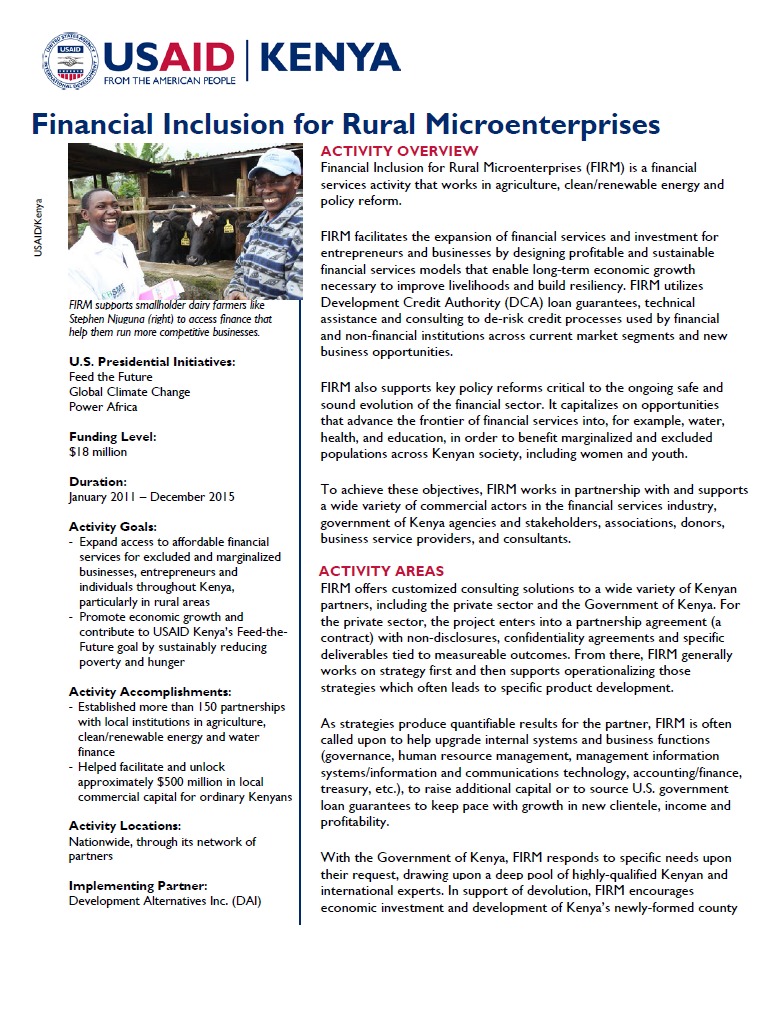U.S. Presidential Initiatives:
Feed the Future
Global Climate Change
Power Africa
Funding Level:
US $18 million
Duration:
January 2011 – December 2015
Activity Goals:
- Expand access to affordable financial services for excluded and marginalized businesses, entrepreneurs and individuals throughout Kenya, particularly in rural areas
- Promote economic growth and contribute to USAID Kenya’s Feed-the-Future goal by sustainably reducing poverty and hunger
Activity Accomplishments:
- Established over 125 partnerships with local institutions in agriculture, clean/renewable energy and water finance
- Helped facilitate and unlock approximately $500 million in local commercial capital for ordinary Kenyans
Activity Locations:
Nationwide, through its network of partners
Implementing Partner:
Development Alternatives Inc. (DAI)
Key Partners:
National Economic and Social Council, National Treasury, National Bank of Kenya, and:
- Banks
- Deposit-taking microfinance institutions
- NGO microfinance institutions
- Savings and Credit Cooperative Organizations (SACCOs)
- Industry associations
- National Treasury
- Central Bank of Kenya
- National Economic and Social Council
ACTIVITY OVERVIEW
Financial Inclusion for Rural Microenterprises (FIRM) is a financial services activity that works in agriculture, clean/renewable energy and policy reform.
FIRM facilitates the expansion of financial services and investment for entrepreneurs and businesses by designing profitable and sustainable financial services models that enable long-term economic growth necessary to improve livelihoods and build resiliency. FIRM utilizes Development Credit Authority (DCA) loan guarantees, technical assistance and consulting to de-risk credit processes used by financial and non-financial institutions across current market segments and new business opportunities.
FIRM also supports key policy reforms critical to the ongoing safe and sound evolution of the financial sector. It capitalizes on opportunities that advance the frontier of financial services into, for example, water, health, and education, in order to benefit marginalized and excluded populations across Kenyan society, including women and youth.
To achieve these objectives, FIRM works in partnership with and supports a wide variety of commercial actors in the financial services industry, Government of Kenya agencies and stakeholders, associations, donors, business service providers, and consultants.
ACTIVITY AREAS
FIRM offers customized consulting solutions to a wide variety of Kenyan partners, including the private sector and the Government of Kenya. For the private sector, the project enters into a partnership agreement (a contract) with non-disclosures, confidentiality agreements and specific deliverables tied to measureable outcomes. From there, FIRM generally works on strategy first and then supports operationalizing those strategies which often leads to specific product development.
As strategies produce quantifiable results for the partner, FIRM is often called upon to help upgrade internal systems and business functions (governance, human resource management, management information systems/information and communications technology, accounting/finance, treasury, etc.), to raise additional capital or to source U.S. government loan guarantees to keep pace with growth in new clientele, income and profitability.
With the Government of Kenya, FIRM responds to specific needs upon their request, drawing upon a deep pool of highly-qualified Kenyan and international experts. In support of devolution, FIRM encourages economic investment and development of Kenya’s newly-formed county governments to create the conditions for increased investment in Kenya’s critical agriculture and finance value chains.
FIRM also supports the underdeveloped renewable energy sub-sector under the U.S Presidential Power Africa Initiative. To do so, the activity works through a growing array of financial services providers that includes banks, microfinance institutions, Savings and Credit Cooperative Organizations, financial service associations, community-based organizations and water boards.
ACTIVITY IMPACT
Fifty-year-old Mariam Salim is an influential figure in her community. She’s the chairperson of a 25-member women’s group in Kisauni, Mombasa County, and she also holds the esteemed title of “Mzee wa mtaa” or village elder — holding these titles means she is regularly involved in the day-to-day affairs of her small neighborhood. The well-respected mother of four is also known for her culinary talents and she serves what her customers describe as the best chapatis, mandazis and viazi karais (fried potatoes) for miles. Mariam prepares these dishes from her small front-door verandah using charcoal as her main source of fuel for cooking.
Mariam discovered a sustainable way of saving money and managing her fuel costs. Through a small asset-based loan from Kenya Women’s Finance Trust Bank (KWFT), a Kenyan financial institution, Mariam acquired an energy-saving multipurpose jiko (stove). By paying monthly installments of 250 Kenyan Shillings (Ksh), or $3, every month for a year, she’s now the proud owner of the energy-saving jiko that has enabled her to reduce the amount of charcoal she uses from an average of four bags each month to one bag each month. Mariam has also recently installed a three-lamp solar lantern system in her home through another asset-based loan that costs her 950 Ksh a month ($11) in a one-year repayment plan — a much cheaper deal than the 3,000 Ksh ($35) she used to spend on buying kerosene for lighting each month. These new acquisitions have helped her to drastically reduce her energy costs, but more importantly, these innovations contribute to environmental conservation efforts by fostering the adoption of more sustainable ways of consuming natural energy resources.
“Our homes have been transformed,” says Mariam. “Our children can study at night without problems, our businesses are thriving, we are saving handsomely and I can barely remember the hassles of using kerosene lamps,” she boasts.
USAID Contacts:
Benson Kimithi, Activity Manager
USAID Kenya
Agriculture, Business and Environment Office
Tel: +254 208 622 432
Email: bkimithi@usaid.gov
Financial Inclusion for Rural Microenterprises Contact:
Mark Rostal, Chief of Party
Financial Inclusion for Rural Microenterprises
Tel: +254 707 918 665
Email: mark_rostal@dai.com
Website:
www.kenyafirm.org
Updated August 2014








Comment
Make a general inquiry or suggest an improvement.